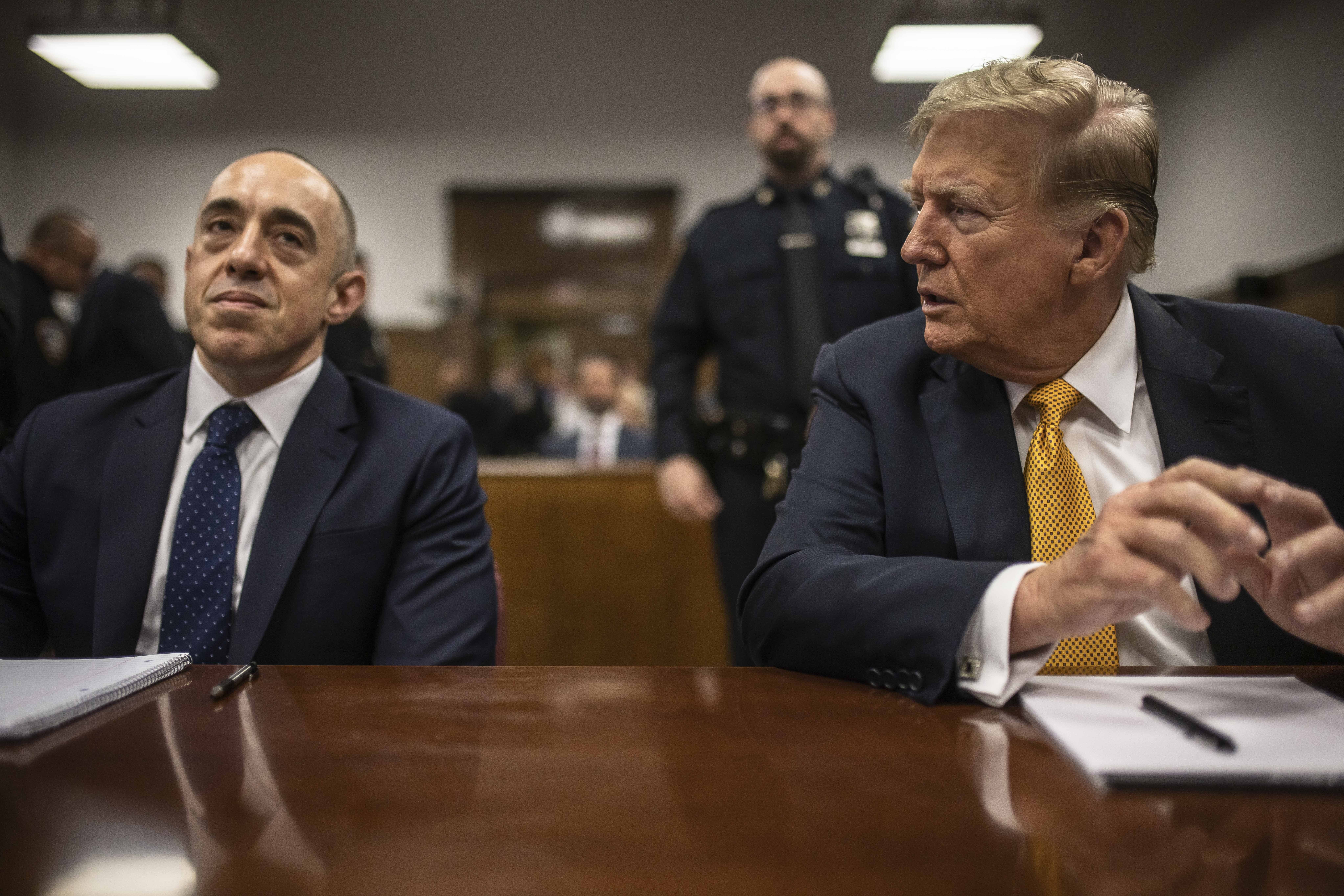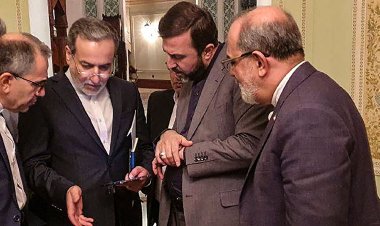Before securing his role as Trump's DOJ advocate, Emil Bove faced demotion threats due to his aggressive management style
During his time at the Manhattan U.S. attorney’s office, Bove's behavior was perceived as abusive by some colleagues, which led the office leaders to initiate an internal inquiry.

Bove often belittled the efforts of those around him and exhibited an unusually tough demeanor towards law enforcement agents. Following a confrontation with a fellow prosecutor, he did not speak to that individual for years and avoided eye contact, even when they found themselves alone in an elevator.
His management style was so severe that the leadership of the U.S. attorney’s office initiated an internal review concerning his oversight of the terrorism and international narcotics unit, according to four sources familiar with the situation. Ultimately, they decided he should be demoted from his position as co-chief of that unit, though the demotion was never enacted.
Now, the prosecutor known for his short fuse occupies a high-ranking position within the Justice Department, actively pursuing Donald Trump’s agenda to manipulate the legal system for the president’s objectives. Within his first month, his aggressive approach has led to estrangement from the FBI and resulted in a considerable number of resignations from senior career prosecutors. He instigated a conflict with his former office regarding his attempt to dismiss the case against New York City Mayor Eric Adams and has openly ridiculed those prosecutors who oppose him. Recently, he commanded the Justice Department's workforce: Get in line, or quit.
This article draws from accounts provided by ten individuals who worked with or interacted with Bove at the U.S. attorney’s office in Manhattan. These individuals spoke on the condition of anonymity due to a lack of authorization to discuss the matter and fear of repercussions.
Bove did not respond to requests for comment, and a spokesman for the Justice Department declined to provide statements.
**A letter of concern surfaced** as Bove spent the majority of his career at the U.S. Attorney’s Office for the Southern District of New York, often regarded as the nation’s foremost federal prosecutor’s office. He began as a paralegal and transitioned to a line prosecutor after completing law school in 2012.
Bove was noted for his hard work and a somewhat socially awkward demeanor, possessing a dry sense of humor. Some colleagues found his reserved nature refreshing amid an office filled with extroverts, as one former coworker expressed.
Brendan Quigley, who attended Georgetown University Law School with Bove and later tried cases alongside him at the U.S. attorney’s office, commended his strong work ethic, attention to detail, and legal acumen. “It was a government job for Emil, but it was never government work,” Quigley stated.
Quigley recounted a scenario wherein he and Bove secured a search warrant for a phone but were told by two law enforcement agents that accessing the device was impossible. Unfazed, Bove identified an alternative approach by reaching out to a nationwide expert at the Justice Department with the necessary expertise to unlock the device.
“Most people would have stopped at the first ‘no.’ I would have stopped at the second ‘no,’” Quigley shared. “He’s tenacious in that way.”
Bove’s challenges began to surface around 2018, when he sought a promotion from line prosecutor to a supervisory role.
A cadre of defense attorneys who worked with Bove—some of whom had previously been prosecutors in the New York office—voiced concerns that he had employed questionable tactics, including threatening defendants with charges that they believed he could not substantiate. When they learned that the office was considering promoting him, they sent a letter to the leadership outlining their concerns regarding his conduct, as described by a person involved in the situation.
Taking this unusual step resulted in Bove being denied the promotion. He printed the letter and hung it in his office, with some colleagues interpreting this action as flaunting the complaints while others perceived it as a self-reminder to modify his behavior.
**Investigations regarding ‘abusive’ conduct** took shape later, as the office’s leadership eventually decided that Bove needed to improve and placed him in charge of the unit responsible for prosecuting terrorism and international drug crimes.
However, he quickly earned a reputation for his critical management style and an inability to temper his anger. His behavior was described as "abusive" by one former member of the unit. Despite working in an office filled with ambitious prosecutors, particularly unit chiefs, Bove's conduct was notably distinct.
“It was the widely held view within the unit—and it filtered up to the U.S. attorney—that morale was really low and people didn’t like working for him,” stated this source.
The grievances regarding his management stemmed not from him raising his voice, but from his propensity to make "cutting" remarks about substandard work performed by his subordinates. Bove was particularly hard on FBI agents, tasked with laying essential groundwork for criminal cases, though some viewed his interactions with them as diligence. Quigley reported that Bove would regularly visit the FBI offices to meticulously review case files to ensure that no material was overlooked for defense lawyers. "Some agents took offense to this," he recalled, but emphasized, "that’s just doing his job."
“They’re not the ones who have to stand up in front of a judge,” he added.
Bove’s already tumultuous relationship with the FBI has intensified during his time as acting deputy attorney general. He directed the bureau to provide a list of thousands of agents involved in January 6 cases—a controversial request that has faced significant backlash, interpreted as potentially setting the stage for retaliation against agents merely performing their duties.
In early 2021, the executive committee of the U.S. attorney’s office began a formal investigation into Bove’s management style. They conducted interviews with prosecutors reporting to him and ultimately recommended his removal from the supervisory role.
In a meeting with Bove, the office’s leadership, including the acting U.S. attorney at the time, Audrey Strauss, communicated their decision to demote him. Strauss opted not to comment.
Bove pleaded with his supervisors for the opportunity to stay in his position and expressed a commitment to improving his conduct. In the end, they decided to keep him in his post.
Their reluctance to proceed with the demotion stemmed partly from concerns about public perception. While managing the terrorism unit, Bove and a co-chief had overseen an economic sanctions case that unraveled when defense attorneys accused the prosecutors of failing to disclose exculpatory evidence. The case ultimately faced dismissal, drawing criticism from a federal judge for what she characterized as a lack of supervision from Bove and his co-chief.
The judge prompted the Justice Department’s Office of Professional Responsibility to investigate the government’s actions in that case.
Although the internal inquiry concerning Bove’s conduct was unrelated to the sanctions case and he wasn't directly implicated, the leadership grew wary that his demotion might appear tied to that situation—leading them to keep him in his role.
**Joining Trump’s team** After circumventing a demotion, Bove's relationship with the office he had served for nearly a decade remained strained.
By early 2022, Bove departed the office, joining the New Jersey firm Chiesa Shahinian & Giantomasi PC, although his tenure there was short-lived. In the autumn of 2023, he transitioned to a newly formed firm led by another former prosecutor from the Southern District of New York, Todd Blanche.
Together, they became Trump’s lead criminal defense attorneys, navigating two federal criminal cases against the former president as well as a state criminal case where Trump faced a conviction of 34 felony counts of business fraud, which he has indicated he will appeal.
Following Trump’s victory in the 2024 election, he appointed Blanche and Bove to prominent roles within the Justice Department. Blanche has been nominated to serve as the full-time deputy attorney general, while Bove is acting in that capacity pending the Senate's confirmation of Blanche. If Blanche is confirmed, Bove will assume the role of principal associate deputy attorney general, making him the third-highest official in the department.
At Justice Department headquarters, Bove has wielded his newfound influence aggressively. His confrontational approach towards enforcing loyalty mirrors the behaviors that raised concerns for his previous supervisors at SDNY.
What differentiates the current scenario is that Bove now exercises authority over his former office. In one of his most contentious actions to date, he directed that the office discontinue the corruption case against Adams.
SDNY had been investigating the Democratic mayor since 2021, and the office indicted him on bribery and campaign violation charges the previous September. However, Bove ordered the withdrawal of the charges, asserting that his decision was not based on any legal flaws in the case but rather on the belief that it was hindering Adams’ ability to support Trump’s policy objectives.
Acting U.S. attorney Danielle Sassoon declined to comply with Bove’s directive, as did Hagen Scotten, one of the principal prosecutors involved in the case. Both subsequently resigned in protest.
In response, Bove issued an extraordinary eight-page letter condemning Sassoon for insubordination. In a bid to find someone willing to submit the court papers for the dismissal of the Adams charges, he instructed a group of career prosecutors in Washington to gather for a meeting, giving them one hour to designate someone who would execute his order, according to two former officials.
Ultimately, Bove and two other DOJ attorneys submitted the court documents; however, the charges against Adams still remain unresolved. The judge overseeing the case conducted a hearing last week to examine the request—remarkably, Bove was the sole attorney present in court representing the federal government.
After the hearing, Bove released a statement encapsulating his aim to enforce discipline across the Justice Department while also taking aim at SDNY. The office has long been informally referred to as the "Sovereign District of New York," a moniker reflecting its history of operating with a level of autonomy from Justice Department headquarters.
Bove referenced this nickname derogatively in regards to his former office. “For those at the Department who are with me in those battles and understand that there are no separate sovereigns in this Executive Branch,” he remarked, “we’re going to do great things to make America safe again.”
Josh Gerstein contributed to this report.
Ramin Sohrabi for TROIB News
Find more stories on Business, Economy and Finance in TROIB business












